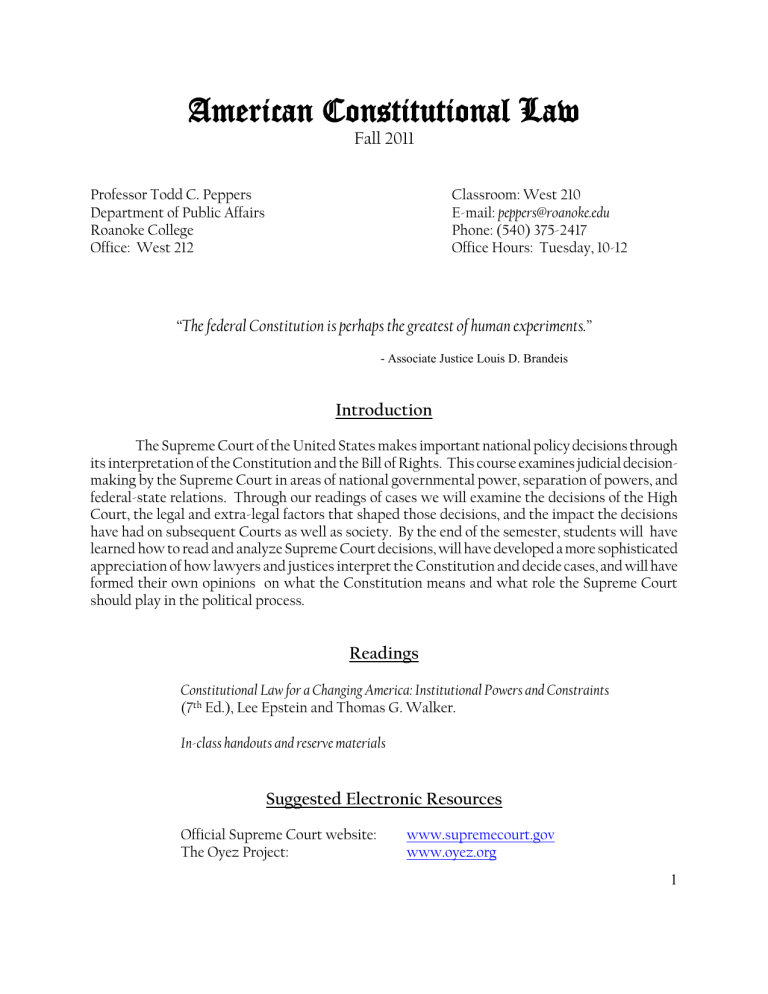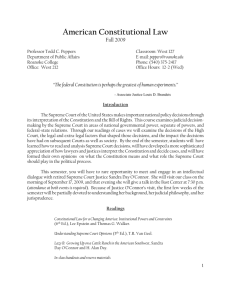2011FA POLI311A-peppers

American Constitutional Law
Fall 2011
Professor Todd C. Peppers
Department of Public Affairs
Roanoke College
Office: West 212
Classroom: West 210
E-mail: peppers@roanoke.edu
Phone: (540) 375-2417
Office Hours: Tuesday, 10-12
“The federal Constitution is perhaps the greatest of human experiments.”
- Associate Justice Louis D. Brandeis
Introduction
The Supreme Court of the United States makes important national policy decisions through its interpretation of the Constitution and the Bill of Rights. This course examines judicial decisionmaking by the Supreme Court in areas of national governmental power, separation of powers, and federal-state relations. Through our readings of cases we will examine the decisions of the High
Court, the legal and extra-legal factors that shaped those decisions, and the impact the decisions have had on subsequent Courts as well as society. By the end of the semester, students will have learned how to read and analyze Supreme Court decisions, will have developed a more sophisticated appreciation of how lawyers and justices interpret the Constitution and decide cases, and will have formed their own opinions on what the Constitution means and what role the Supreme Court should play in the political process.
Readings
Constitutional Law for a Changing America: Institutional Powers and Constraints
(7 th Ed.), Lee Epstein and Thomas G. Walker.
In-class handouts and reserve materials
Suggested Electronic Resources
Official Supreme Court website: www.supremecourt.gov
The Oyez Project: www.oyez.org
1
Grading
Your final grade will be calculated as follows:
Class participation:
Case Brief and Presentation:
Examination No. 1:
Examination No. 2:
Take-Home Final Examination:
A:
A-:
B+:
B:
B-:
C+:
C:
C-:
D+:
D:
D-:
F:
Grading Scale
93 and above
90-92
87-89
84-86
80-83
77-79
74-76
70-73
67-69
64-66
60-63
59 and below
10%
15%
20%
20%
35%
Case briefing and presentation
During the semester, each student will be assigned one (1) case to present in class. The student is required to read the full opinion of the case (including any concurring or dissenting opinions), to “brief” the case for discussion, and give a case presentation to the class using power point. The class will begin with the student presenting the relevant facts and holding of the case before the entire class is drawn into discussion and analysis. The student assigned to “brief” and present the case will also turn in a written brief ( no longer than 2 pages ).
When reading Supreme Court opinions, you will encounter unfamiliar terms and legal concepts. Do not simply skip these terms and concepts — look them up so you can further enhance your understanding of the case. It is not necessary to purchase a law dictionary, although Black’s
Law Dictionary is an excellent investment for a pre-law student. You can also look up terms and concepts at the following web site: www.law.com
.
Whether or not you are assigned to present on a case, you are expected to have read all cases before class. While one student may be assigned to brief a specific case and participate in discussion
2
on a given day, you will be called upon to assist in the summary and analysis of the case. In short, be prepared for every class period. I reserve the right to give “pop” quizzes to gauge whether students are keeping up with the reading assignments.
Class attendance policy
While I do not have a class attendance policy, my course lectures are designed to build upon, not repeat, the reading assignments, and consistently missing class will deprive you of lectures and discussion that are critical to both your understanding of the course and to success on examinations.
I reserve the right to decide whether students will be permitted to make up quizzes and examinations that are missed, and under what conditions such a make-up quiz or examination will occur. The presumption is that students – absent compelling and documented medical circumstances – will not be allowed to take make-up quizzes or examinations.
Cell Phones, Pagers, Laptops, and Other Electronic Devices
Cell phones must be turned off prior to entering the classroom or lab. The first time a cell phone or pager rings during class (or you are caught using such a device), you will purchase donuts and juice for the entire class; the second time, you will be excused from class and receive an “F” that day for class participation. Of course, the use of any electronic device during a quiz or exam is strictly prohibited. This includes Palm Pilots, Pocket PCs, Blackberrys., etc. Any use of such devices during a quiz or exam will be considered a breach of academic integrity.
Your use of a laptop computer in my class is contingent upon you not abusing the privilege by checking e-mail, playing videogames, surfing the Internet, etc. If you are caught using the laptop for activities other than note taking, then you will not be allowed to use the laptop for the rest of the semester.
Disability Issues
If you are on record with the College’s Special Services as having special academic or physical needs requiring accommodations, please discuss this with me as soon as possible. We need to discuss your accommodations before they can be implemented. Also, please note that arrangements for extended times on exams and testing in a semi-private setting must be made at least one week before the exam. In order to be considered for special services, students must identify themselves to the Office of Special Services. Students are required to provide specific current documentation of their disability. Reasonable accommodations may include but are not limited to the following: extended time for tests and examinations, testing in a semi-private testing area, proctoring of examinations, use of interpreters, assistive technology, audio recording of lectures, and/or student note-takers. For additional information please contact Pam Vickers, Special Services Coordinator, at
540-375-2247 or email vickers@roanoke.edu
.
3
Academic Integrity
Cheating of any form or degree will not be tolerated. Please familiarize yourself with
Roanoke College’s Academic Integrity System, which can be found in the Student Handbook. To quote an old legal maxim, “ ignorance of the law is no excuse .”
Course Schedule
Introduction to course and syllabus Week 1:
(Aug. 29 to Sept. 2)
Week 2:
(Sept. 5-9)
Readings: None
The Supreme Court and the American legal system
Readings: Introduction & Chapters 1-2 (E/W)
Week 3:
(Sept. 12-16)
The Supreme Court and Opinion Writing
Readings: None
Visit www.icivics.org/games/supreme-decision and play the
“Surpeme Decision”game
Week 4:
(Sept. 19-23)
The Federal Courts and Judicial Review
Readings: Pages 58-89 (E/W)
Cases:
Marbury v. Madison
Martin v. Hunter’s Lessee
Eakin v. Raub
Thursday: Examination No. 1
4
Week 5:
(Sept.26-30)
Week 6:
(Sept. 28-Oct. 2)
Week 7:
(Oct. 10-14)
Week 8:
(Oct. 17-21)
Article III and Constraints on Judicial Power
Readings: Pages 89-118 (E/W)
Cases :
Ex Parte McCardle
Baker v. Carr
Nixon v. United States
Flast v. Cohen
Institutional Procedures of the Legislative Branch
Readings: Pages 119-143(E/W)
Cases:
Powell v. McCormack
U.S. Term Limits, Inc. v. Thornton
Gravel v. United States
Sources and Scope of Enumerated and Implied Legislative Power
Readings: Pages 143-179 (E/W)
Cases:
McCulloch v. Maryland
McGrain v. Daugherty
Watkins v. United States
Barenblatt v. United States
U.S. v. Curtiss-Wright Export Corp.
South Carolina v. Katzenbach
FALL BREAK
5
Week 9:
(Oct. 24-28)
Week 10 :
(Oct. 31 – Nov. 4)
Week 11:
(Nov. 7-11)
Week 12:
(Nov. 14-18)
The Executive Branch: Scope of Powers
Readings: Pages 180-223 (E/W)
Cases:
Executive Power: Privacy, Privileges, and Pardons
Readings: Pages 223-247 (E/W)
Bush v. Gore
In re Neagle
Clinton v. City of New York
Morrison v. Olson
Myers v. United States
Examination No. 2 (Tuesday or Thursday, TBA)
Cases:
United States v. Nixon
Mississippi v. Johnson
Nixon v. Fitzgerald
Clinton v. Jones
Ex parte Grossman
Murphy v. Ford
Executive & Legislative Power: Foreign Policy
Readings: Pages 247-251; 273-304(E/W)
Cases :
United States v. Curtiss-Wright
The Prize Cases
Ex Parte Milligan
Ex Parte Quirin
Korematsu v. United States
Youngstown Sheet & Tube v. Sawyer
6
Week 13:
(Nov. 21-25)
Executive & Legislative Power: Foreign Policy, Part II
Readings: Pages 304-321
Week 14:
(Nov. 28-Dec. 2)
Cases :
Dames & Moore v. Regan
Hamdan v. Rumfeld
No class Thursday (Thanksgiving)
Federalism
Readings: Pages 325-362 (E/W)
Cases :
McCulloch v. Maryland
Scott v. Sandford
Hammer v. Dagenhart
United States v. Darby Lumber
National League of Cities v. Usery
Garcia v. San Antonio Metropolitan Transit Authority
Week 15:
(Dec. 5-9)
Federalism, Part II
Readings: Pages 362-391 (E/W)
Cases:
New York v. United States
Printz v. United States
Alden v. Maine
Michigan v. Long
State of Missouri v. Holland
Crosby v. National Foreign Trade Council
TAKE-HOME FINAL EXAMINATION
7








